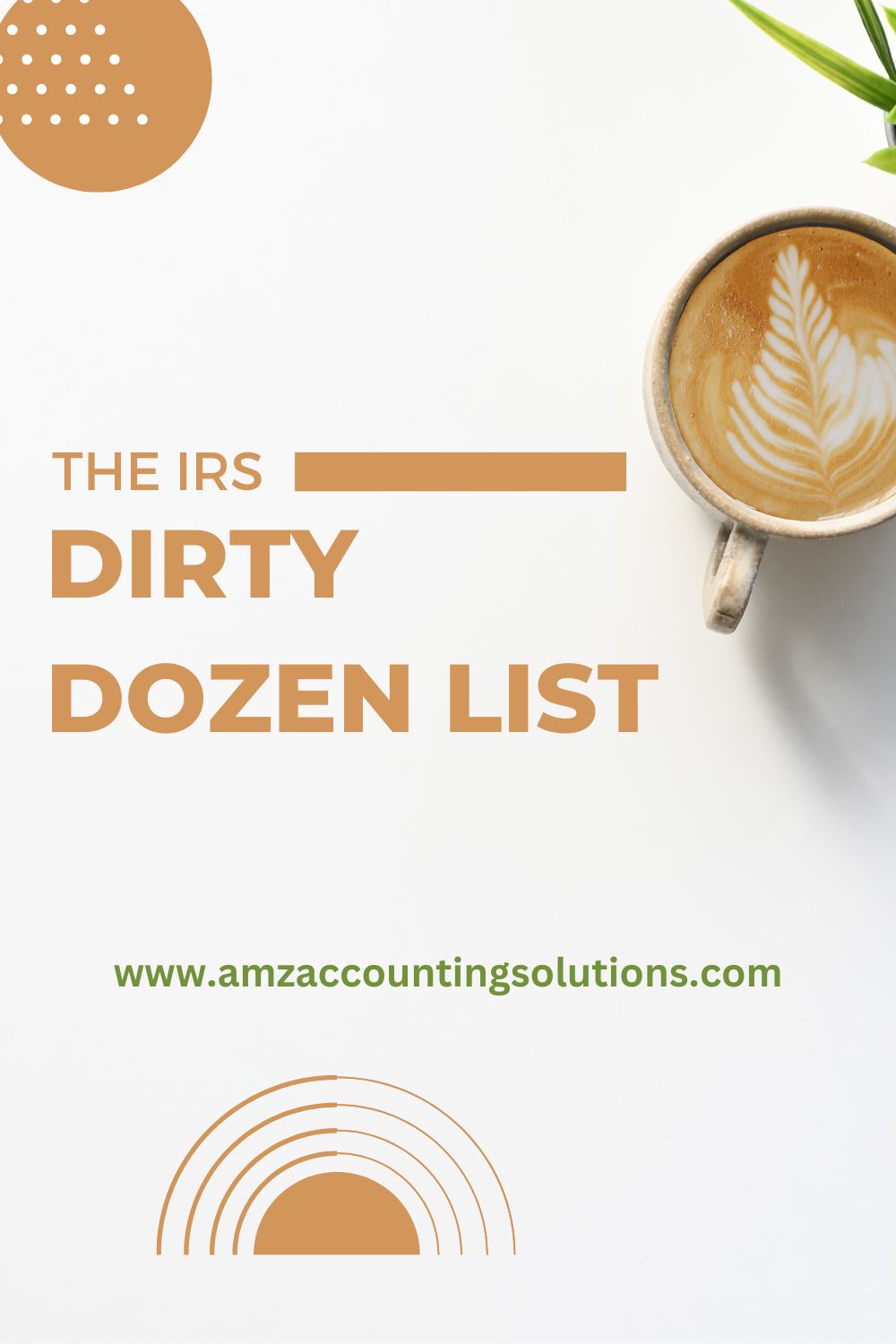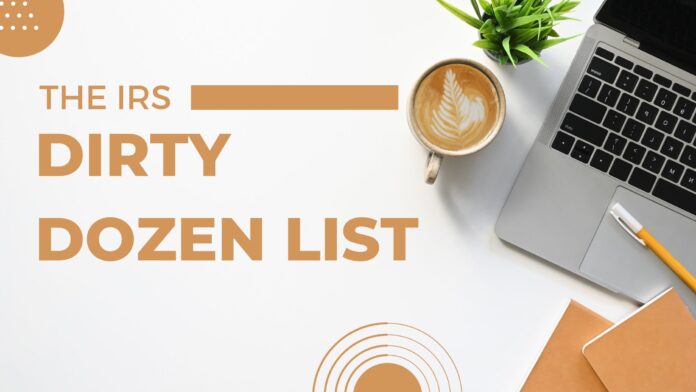For over 20 years, the IRS has released a series of notices identifying tax scams and avoidance schemes, which the agency calls the “Dirty Dozen” (an apparent reference to the classic 1967 World War II movie starring Lee Marvin and Jim Brown).
Is the IRS Dirty Dozen just an IRS publicity gimmick, or is it useful for taxpayers, tax preparers, and tax advisors?
The Dirty Dozen list is quite useful and is something you should review each year.
2023 Dirty Dozen List
The IRS updates its Dirty Dozen each year. Here’s a summary of the items on the 2023 Dirty Dozen list:
1. Employee Retention Credit Claims
These are aggressive pitches from promoters to con ineligible employers into claiming the employee retention tax credit. Promotions can be based on inaccurate information related to eligibility for and computation of the credit.
2. Phishing and Smishing
These are fake communications from scammers posing as IRS agents or other tax or financial community members. These messages arrive as unsolicited texts (smishing) or email (phishing) to lure unsuspecting victims into providing valuable personal and financial information that can lead to identity theft.
3. Online Account Help from Third-Party Scammers
Swindlers pose as a helpful third party and offer to help create a taxpayer’s IRS online account at IRS.gov. They then try to steal a taxpayer’s personal information.
4. False Fuel Tax Credit Claims
The fuel tax credit is meant for off-highway business and farming use and is unavailable to most taxpayers. But unscrupulous tax return preparers and promoters inflate taxpayer refunds by improperly claiming the credit.
5. Fake Charities
Scammers set up fake charities and seek financial and personal information, which they then use to exploit victims through identity theft.
6. Unscrupulous Tax Return Preparers
The IRS admits that “most tax preparers provide outstanding and professional service” but warns against scammer preparers, especially “ghost” preparers who prepare tax returns but refuse to sign them or include their IRS Preparer Tax Identification Number (PTIN).
7. Social Media: Fraudulent Form Filing and Bad Advice
The IRS warns that inaccurate or misleading tax information on social media can involve standard tax documents such as Form W-2 and more obscure ones such as Form 8944, Preparer e-file Hardship Waiver Request. Schemers use these forms to encourage people to submit false, inaccurate information in hopes of getting a refund.
8. Spearphishing and Cybersecurity for Tax Professionals
Phishing emails or text messages are designed to get users to provide personal information. Spearphishing is a phishing attempt tailored to a specific organization or business. The IRS warns tax professionals about spearphishing attacks to steal client data and the tax preparer’s identity, allowing the thief to file fraudulent returns.
9. Offer in Compromise Mills
Offer in Compromise “mills” aggressively promote Offers in Compromise in misleading ways to people who don’t meet the qualifications, which can cost a taxpayer thousands of dollars.
10. Schemes Aimed at High-Income Filers
Charitable remainder annuity trust (CRAT). These irrevocable trusts let individuals donate assets to charity and draw annual income for life or a specific period. The promoters, advisors, and taxpayers sometimes misuse trusts to eliminate ordinary income and capital gains on property sales.
Monetized installment sales. Fee-based promoters facilitate a purported monetized installment sale to enable taxpayers to defer recognition of gain upon the sale of appreciated property.
11. Bogus Tax Avoidance Strategies
Micro-captive insurance arrangements. A micro-captive is an insurance company whose owners elect to be taxed on the captive’s investment income only. Abusive micro-captives lack many attributes of legitimate insurance—for example, they may insure implausible risks, fail to match genuine business needs, or unnecessarily duplicate the taxpayer’s commercial coverages.
Syndicated conservation easements. Certain fee-based promoters help taxpayers claim grossly inflated charitable deductions for conservation easements.
12. Schemes with International Elements
Offshore accounts and digital assets. Taxpayers attempt to conceal income in offshore banks, brokerage accounts, digital asset accounts, and nominee entities.
Maltese individual retirement arrangements misusing treaty. U.S. citizens or residents contribute to foreign individual retirement arrangements in Malta (and possibly other host countries). They then claim an exemption from U.S. income tax on gains and earnings from the foreign arrangement by improperly asserting that it is a “pension fund” for U.S. tax treaty purposes.
Puerto Rican and foreign captive insurance. U.S. business owners obtain a financial interest in a Puerto Rican or other foreign corporation and then claim a deduction for insurance premiums paid to that fronting carrier corporation. These arrangements lack many of the attributes of legitimate insurance.
What’s New? What’s Gone?
Many items appear on the Dirty Dozen year after year, but there are usually new ones each year as well. New scams and schemes for 2023 include
- fraudulent employee retention credit claims,
- social media bad advice,
- online account help from third-party scammers,
- false fuel credit scams, and
- unscrupulous tax preparers.
The 2022 Dirty Dozen list contained the following items that were dropped from the 2023 list:
- pandemic-related scams
- unemployment fraud
- fake employment offers posted on social media
- high-income individuals who fail to file.
The fact that the IRS dropped an item from the list does not mean it has fallen off the IRS’s radar. Only so many items can fit on the list. Some items fall off the list, and the IRS brings them back in future years. You can find links to the annual Dirty Dozen lists going back to 2014 on the IRS website.
The IRS Scrutinizes Strategies on the Dirty Dozen List
Some items on the Dirty Dozen list involve outright fraud, such as identity theft or using fake charities.
Other items involve tax credits or deductions, such as conservation easements, that can be legitimate but also (in the IRS’s view) are prone to abuse by taxpayers. These items are red flags for IRS scrutiny and can result in aggressive enforcement action against taxpayers who claim such deductions or credits and against those who promote them.
For example, the IRS has audited hundreds of abusive syndicated conservation easement deals.
When you see a new item on the Dirty Dozen list, especially if it’s at the top, you know it’s something the IRS is particularly interested in.
A case in point is the employee retention credit (ERC). It didn’t make it to the list until 2023, and the IRS placed it at the top. This tells you that combating fraudulent ERC claims is a high priority for the IRS.
This doesn’t mean you shouldn’t claim the ERC if you’re entitled to it. Just make sure you have all the necessary records in case of an audit.
The IRS Urges the Public to Report Abusive Schemes on the Dirty Dozen List
As part of its Dirty Dozen awareness effort, the IRS encourages members of the public to report individuals who promote improper and abusive tax schemes as well as tax return preparers who deliberately prepare improper returns.
It has even created a special form for this purpose—Form 14242, Report Suspected Abusive Tax Promotions or Preparers.
Referrals may ultimately lead to injunctions against abusive tax promoters or preparers. Other remedies include monetary penalties, suspension or revocation of electronic filing identification numbers, criminal prosecution, and referral to the Office of Professional Responsibility.
The IRS also created an Office of Promoter Investigations in 2021 to identify and stop promoters and enablers of abusive tax avoidance transactions. In addition to promoting the Dirty Dozen list and seeking leads from taxpayers, it plans to “leverage new technology and data analytics to detect and combat sophisticated evasion techniques and facilitate timely audits and collection investigations.”
Some of the Dirty Dozen Are Reportable Transactions
The IRS designates certain types of transactions as reportable transactions. These include listed transactions and “transactions of interest.”
The fact that a transaction is included in the Dirty Dozen does not necessarily make it a listed transaction or transaction of interest. But three of the 2023 Dirty Dozen have been so designated by the IRS:
- certain syndicated conservation easements,
- certain micro-captive insurance transactions, and
- the Malta personal retirement scheme.
Taxpayers who participate in reportable transactions are supposed to disclose them to the IRS by filing Form 8886, Reportable Transaction Disclosure Statement.
Failure to do so subjects them to a penalty equal to 75 percent of the decrease in tax due to the transaction, up to $200,000 ($100,000 for a natural person) for listed transactions and $50,000 ($10,000 for a natural person) for reportable transactions.
“Material advisers” who promote or help implement such transactions must also disclose them to the IRS by filing Form 8918, Material Advisor Disclosure Statement. The penalty for non-disclosure of transactions of interest is $50,000. For listed transactions, the penalty is the greater of $200,000 or 50 percent of the gross income the material advisor derives for providing aid or advice on the transaction.
The IRS imposes these penalties in addition to any other penalties it assesses.
Dirty Dozen Treatment Can Result in Larger Tax Penalties
Employing a strategy or scheme on the Dirty Dozen list not only makes an audit more likely but can also result in substantial tax penalties if an audit occurs and the IRS concludes that taxes were underpaid due to the use of the strategy.
That the strategy was on the Dirty Dozen list can make it challenging to avoid the penalties imposed on
- Taxpayers
- Tax prepares
- Promoters
Penalties Imposed on Taxpayers
The IRS ordinarily imposes an accuracy-related penalty on taxpayers who underpay their taxes because they employed an abusive tax strategy or scheme. The penalty equals 20 percent of the portion of the underpayment attributable to the taxpayer’s negligence or disregard of rules or regulations.
Taxpayers can avoid the accuracy-related penalty if they establish that they had reasonable cause for the underpayment and acted in good faith.15 But it is hard, if not impossible, for taxpayers to demonstrate that they acted in good faith when they adopt a strategy or scheme listed in the IRS’s Dirty Dozen list.
In one case, for example, a partnership used an aggressive tax avoidance strategy called COBRA, marketed by a “big four” accounting firm to claim more than $45 million in paper losses. The IRS disallowed the losses on audit and imposed a 20 percent negligence penalty, which was affirmed on appeal.
The court denied the partnership’s claim that the court should remove the penalty because the partnership acted reasonably and in good faith in relying on the advice it received from its accountants and legal counsel.
One big reason for the court’s denial: The IRS had issued a notice alerting the public that the artificial losses of the COBRA scheme were not properly allowable for federal income tax purposes.16 This is the same type of warning the IRS makes about the abusive schemes in the Dirty Dozen list.
Penalties Imposed on Tax Preparers
Tax preparers can also face civil penalties if they prepare a return with an understatement of tax due to a position they knew (or should have known) was unreasonable.
Preparers found to violate this section face a penalty of the greater of $1,000 or 50 percent of the income derived (or to be derived) by the preparer from the preparation of the return. The IRS can increase the penalty to $5,000 or 75 percent of the income derived for willful conduct or reckless disregard of the rules or regulations.
A position is “unreasonable” unless there is substantial authority for it.
Like a taxpayer, a preparer will have difficulty convincing the IRS or courts that they had a reasonable basis for using a tax strategy clearly labeled in the IRS Dirty Dozen list as a scam or abusive scheme.
Penalties Imposed on Promoters
The IRS can also impose penalties on promoters of abusive tax avoidance transactions, even if they do not prepare the returns. Such promoters may include accounting firms, attorneys, and marketing companies.
The penalty amount depends on whether there was a false or fraudulent statement about the tax benefits of the transaction. If so, the penalty equals 50 percent of the gross income derived (or to be derived) from the activity by the promoter. Otherwise, the penalty is $1,000 for each activity.
Takeaways
Here are four takeaways from this article:
- Every year, the IRS issues a Dirty Dozen list of abusive tax schemes and fraudulent practices. Some of the items on the list involve outright fraud. Others can be legitimate but have been prone to abuse by taxpayers.
- The tax strategies on the Dirty Dozen list are subject to scrutiny by the IRS. The IRS encourages and provides tax forms for taxpayers to report tax preparers and others who promote improper and abusive tax schemes.
- Some of the strategies on the list are reportable transactions that are supposed to be disclosed to the IRS by taxpayers, tax preparers, and promoters.
- Employing a strategy on the Dirty Dozen can also result in tax penalties if the IRS concludes that taxes were underpaid due to the use of the scheme. The fact that the strategy was on the Dirty Dozen list can make it difficult to avoid such penalties.










